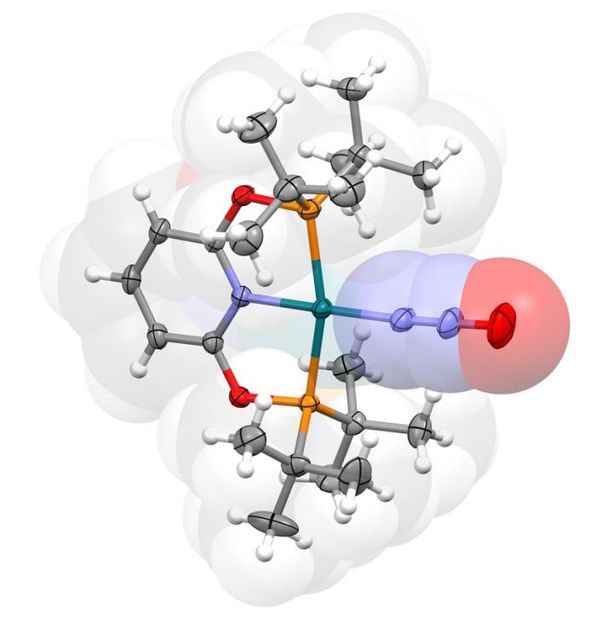Elusive compounds of greenhouse gas isolated
nitrous oxide (N2O) is a potent atmospheric pollutant. Although naturally occurring, anthropogenic N2O emissions from intensive agricultural fertilisation, industrial processes, and combustion of fossil fuels and biomass are a major cause for concern. Researchers at the University of Warwick have isolated elusive transition metal compounds of N2O that provide clues into how it could be used in sustainable chemical technologies.

Nitrous Oxide Compound.
University of Warwick
N2O is a powerful greenhouse gas, with a half life of 114 years in the atmosphere and global warming potential 300 times greater than carbon dioxide. It is also the dominant ozone depleting substance emitted in the 21st century.
As an abundant chemical feedstock, the use of N2O as a sustainable oxidant in synthetic organic chemistry is an attractive prospect, liberating environmentally benign dinitrogen (N2). Such reactions are encumbered by the robust triatomic formulation of this gas, typically requiring forcing reaction conditions that are energy intensive and undesirable from a remediation perspective. The development of mild and selective alternatives is a longstanding ambition of research scientists, but has been met with little success.
In their paper 'Rhodium(I) Pincer Complexes of Nitrous Oxide' published in the journal Angewandte Chemie, researchers from the University of Warwick's Department of Chemistry have reported well-defined compounds of nitrous oxide that provide valuable insights into how this gas interacts with one of the most widely employed transition metals in organic synthesis.
The associated experimental data is the most comprehensive collected to date for any transition metal adduct, for which there are very few precedents. This work provides a fundamental reference point in the field and is likely to stimulate and guide future catalyst developments.
Dr Adrian Chaplin from the Department of Chemistry at the University of Warwick comments: "Nitrous oxide is commonly known as laughing gas, but it's environmental impact is certainly nothing to laugh about and often overlooked altogether. As a chemical reagent its potential has yet to be fully harnessed, and to do so a sustainable manner is formidable challenge for the scientific community."
"In my team, we are trying to tackle this problem using a fundamental, bottom up, approach. The compounds that we have prepared represent the starting point of our journey, but the associated experimental data seems to be guiding us in the right direction and we are looking forward to where it takes us."
Original publication
Other news from the department science

Get the chemical industry in your inbox
By submitting this form you agree that LUMITOS AG will send you the newsletter(s) selected above by email. Your data will not be passed on to third parties. Your data will be stored and processed in accordance with our data protection regulations. LUMITOS may contact you by email for the purpose of advertising or market and opinion surveys. You can revoke your consent at any time without giving reasons to LUMITOS AG, Ernst-Augustin-Str. 2, 12489 Berlin, Germany or by e-mail at revoke@lumitos.com with effect for the future. In addition, each email contains a link to unsubscribe from the corresponding newsletter.



























































